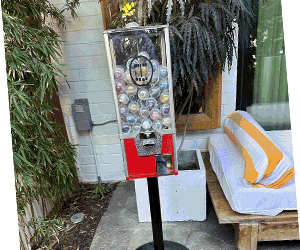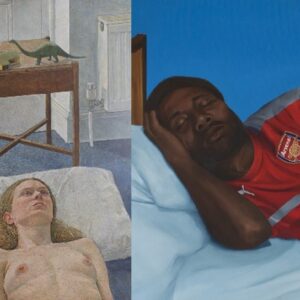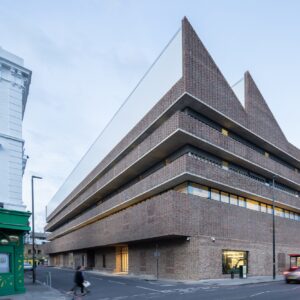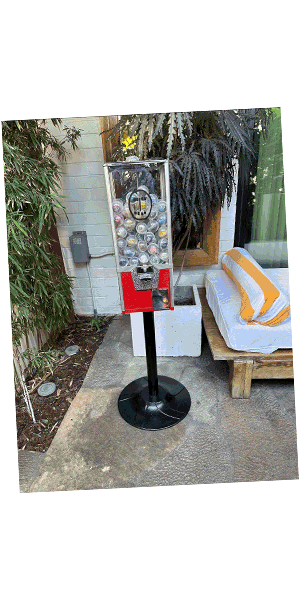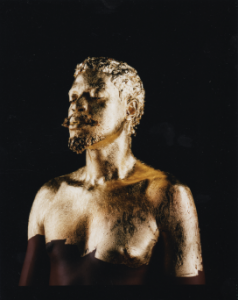
South African born artist Jabulani Maseko will present a performance piece for Film Africa 2012. The performance will take place in the main foyer of the Hackney Picture House on Monday 5 November and will run from 2pm until after the screening of the award-winning documentary ‘Dear Mandela’, which begins at 6.30.
Both Maseko’s performance and ‘Dear Mandela’ draw attention to the challenges facing democracy and citizenship in South Africa today, but also speak to political agency and forms of resistance. ‘Dear Mandela’ tells the story of how three young South African activists formed the ‘Shack Dwellers’ Movement in the face of forced mass evictions of informal settlements. Almost two decades after the official transition to democracy these settlements have mushroomed as the ANC’s promise of ‘housing for all’ has failed to fully materialize.
Maseko’s performance, at the centre of which is his own body, is a dialogue with the protests and violent killings that took place at the Lonmin platinum mines at Marikana in South Africa this year. On 16 August 2012 46 people died and 34 of the miners were shot by the police. The South African media compare the event to apartheid era violence including the Sharpeville Massacre of 1960. The media also refers to the militarisation of the police during the apartheid years; and the continuation of this legacy in South Africa today. Events at Marikana were aggravated by attempts to mobilise an unconstitutional form of Roman Dutch law as a mechanism of punishment. This meant that the South African National Prosecuting Authority charged arrested miners with the murder of their colleagues (although these charges were subsequently dropped). The events at Marikana demonstrate the ways in which the fabric of apartheid remains in a time of democracy; and makes visible the inequalities underpinning democratic processes in South Africa.
Maseko will stage a 7 hour long performance centred around the painting of his body in 24 carat gold leaf. The work draws on art practices that following the transition from apartheid into democracy re-imagines the possibilities of art and its relationship to the political. There is a close relationship between art and politics in South Africa, and art and visual images were often mobilised as forms of resistance during the apartheid era. In the volatile 1980s, during Maseko’s childhood, covertly produced resistance posters, and documentary photographs in service to the news media were visible forms of protest. Following the transition into democracy South African artists have re-considered arts relationship to the political and mediums such as photography, video and performance are visual strategies that open up the meaning of the political in South Africa today. Personal histories and memories are often situated in relationship to larger historical and political narratives. Similarly to contemporary artists working across the world today, the body in South African art opens up ways of thinking about the politics of visual representation in the 21st century.
Maseko is interested in the relationship between his performance, its audiences and its site (the foyer of London’s Hackney Picture House). The politics of mining crosses time and space: it is as much part of the history of Britain as it is of South Africa, and relationships between South Africa and former colonial powers are grounded in the economies of South African mines. South Africa is one of the world’s largest producers of precious metals.
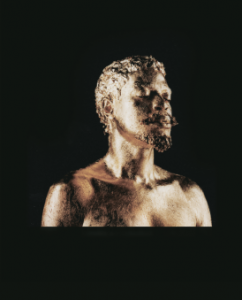
About Jabulani Maseko
Jabulani Maseko is an emerging artist based in London. Born in apartheid South Africa in 1977, politics is an inescapable part of his practice. His work is grounded in ideas about place, histories and experiences of migration, and memories of racial segregation and violence in apartheid South Africa. He is interested in the relationships between past and present: in history and current affairs imagined via media texts and images. Maseko’s work often explores the ghosts and imprints of the past, and draws from the materials, ephemera and objects of everyday life. He is not media specific, and his practice includes drawing, painting, found objects, photography and performance. Language is an important part of his work and enters hand-made diaries, and large-scale, text-based works. He often explores personal memory, family history, story-telling, and myth. His body enters his work both as a medium and as a surface. He uses the imprints of his hands to re-imagine maps of the world or to play with the idea of forensics and finger-printing. The politics of self-representation and performance enter a series of photographic works which form the basis of planned live performances. Here he works with the idea of gold – as an aesthetic material and symbolic substance entangled in the histories and politics of mining in South Africa.
In 2010 Maseko was selected for the residency ‘Art Enclosures’ at the Fondazione Bevilacqua la Masa, Fondazione di Venezia. Venice, Italy. It was here that he began working with gold leaf, and the politics of self-representation.
‘Dear Mandela’
Almost two decades after the end of formal apartheid, the ANC promises of ‘housing for all’ have failed to materialize, and informal settlements have mushroomed; 12 million South Africans – about 20% of the population – currently live in desperate conditions without adequate water, electricity, and sanitation. As forced mass evictions threaten to destroy the lives of families and communities under the seemingly innocuous Slums Act, this award-winning documentary, filmed with warmth and compassion, tells the awe-inspiring story of three dynamic young South African activists determined to stop the bulldozers. Together, they lead the largest social movement in their country – Abahlali baseMjondolo, or the ‘Shack Dwellers’ Movement’. Using the South African Constitution as their guide, and, despite constant threats of violence from ANC-supporters, demolitions, prison detention, and assassination attempts, the shack dwellers take the South African government to the highest court in the country to fight for their right to a home.
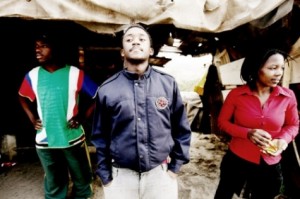
Film Africa 2012
Film Africa is London’s biggest annual festival of African film and culture. From November 1-11, Film Africa 2012 will screen 70 of the best fiction, documentary and short films from across the continent, with lively Q&As and panel discussions with 35 leading filmmakers, and a dynamic programme of professional workshops and cultural events, including nine nights of African music, family activities and a specially commissioned alternative cinema, the Picha House, with free screenings throughout the festival.
Film Africa is co-directed by Lindiwe Dovey and Namvula Rennie, and brought to you by the Royal African Society and SOAS, University of London. Film Africa 2012 is hosted by the Hackney Picturehouse and The Ritzy, with partner venues including the Rich Mix, BFI Southbank, South London Gallery and Screen on the Green.
Jabulani Maseko’s performance will take place in the foyer of the Hackney Picture House from 2pm, on Monday 5 November. The performance will come to a close following the screening of ‘Dear Mandela’, and the panel discussion that accompanies it.
‘Dear Mandela’ (2011) will be screened at 6.30, and is 93 minutes long. It is followed by a panel discussion with members of Abahlali baseMjondolo and War on Want about Abahlali and the ANC. The documentary, directed by Dara Kell and Christopher Nizza, is the winner, best South African documentary, 2011 Durban International film festival.
Maseko’s performance is free, and takes place courtesy of Film Africa 2012 (www.filmafrica.org.uk), and the Hackney Picture House. Tickets for ‘Dear Mandela’ are £6 (£5 concessions/£4 members/£4 child). The performance will continue until after the panel discussion.
For more information and to book tickets: www.filmafrica.org.uk/film/dear-mandela
Any questions about Jabulani Maseko’s performance can be directed to Yvette Greslé at yvegresle@gmail.com.
